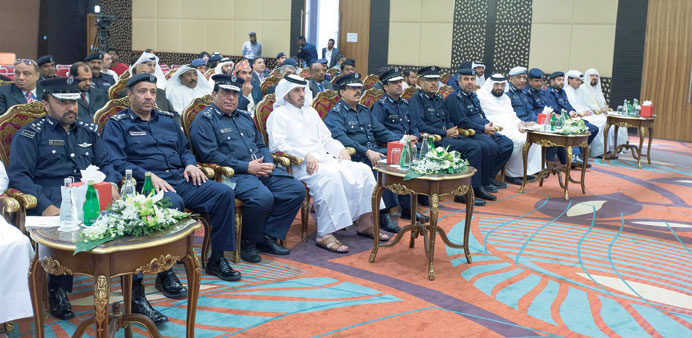By Ayman Adly/Staff Reporter
Qatar has become an example of peaceful co-existence within a multi-cultural society that hosts a large number of nationalities, a senior security official has said.
As a clear indicator of this, Qatar assumed a leading position – for the fourth consecutive year - in the Global Peace Index (GPI) 2012 for Middle East and North Africa (Mena) - Qatar got the first position at the Arab level and 12th internationally, he said.
GPI takes into account standards such as low levels of crime, degree of respect for human rights, equal health and education opportunities and the absence of internal and social conflicts.
The Ministry of Interior (MoI) yesterday launched the celebration of Arab Human Rights Day under the auspices of HE the Minister of State for Interior Affairs Sheikh Abdullah bin Nasser bin Khalifa al-Thani. The three-day celebrations have adopted the theme, “The Culture of Dialogue and Tolerance to Enhance the Protection of Human Rights”.
A number of senior MoI and National Human Rights Committee (NHRC) officials attended the opening ceremony along with representatives of expatriate communities in Doha.
“Our participation is in accordance with the interest of Qatar in human rights and its keenness to respect and protect them, providing all possible guarantees at all levels - politically, economically, socially, culturally and otherwise. This has been achieved through a series of developmental and democratic transformations that have taken place in the country since HH the Emir Sheikh Hamad bin Khalifa al-Thani assumed power,” said Col Abdulla Saqr al-Muhannadi, director of the MoI’s Human Rights Department.
The official said these achievements include the creation of the permanent constitution of the country, formation of the Central Municipal Council and NCHR, freedom for the press and civil society organisations, and women’s empowerment. Besides, Qatar has played a key role in the peaceful settlement of internal conflicts in some Arab countries through sound and balanced diplomacy.
Col al-Muhannadi explained that Qatari legislations have guaranteed equal rights for all its inhabitants - both citizens and expatriates. These, in turn, guarantee free expression of different beliefs and cultures, fostering mutual respect among the followers of the diverse creeds and trends. This diversity gives the society its strength, along with legislations that punish those who spread hatred, call for racism, for contempt of religions or any action that undermines or threatens social cohesion and peace among communities.
“Human rights and the related basic rights are no longer an optional issue in today’s world. It has come to be among the most important issues of international and regional interest. Further, the status and position of countries are influenced by the degree of their respect for human dignity,” said NHRC assistant secretary general Sultan Hassan al-Jamali.
He said people cannot advance unless they accept “the other” and respect his rights, which can be achieved through tolerant collective dialogue that gathers all the components of society.
The official further pointed out that tolerance was the main pillar of mutual respect among people and the key component for building a unified society based on common values.
Dr Siham Farouq, a senior official in the human rights department of the Arab League, stressed that social, political and economic negligence of the needs of people has made them rise and demand democratic and political reforms, culminating in the events of the Arab Spring.
HE the Minister honoured a number of heads of expatriate communities in Doha for co-operating with the MoI’s awareness efforts. They include Munir Issa (Lebanon), Ishmael Sabbuh (Indonesia), Habibullah Sheikh (Pakistan), Mohamed al-Najar (Egypt), Mohamed Jassem (Bangladesh), representatives of the Nepali and Indian communities and several Arab, Asian and African communities.
Besides, HE the Minister gave a special gift to Sheikh Dr Ali al-Qurra Daghi, secretary general of the International Union for Muslim Scholars, for his efforts. The latter delivered a lecture on the values of tolerance in Islam.

HE the Minister of State for Interior Affairs Sheikh Abdullah bin Nasser bin Khalifa al-Thani at the opening ceremony yesterday along with senior mini
